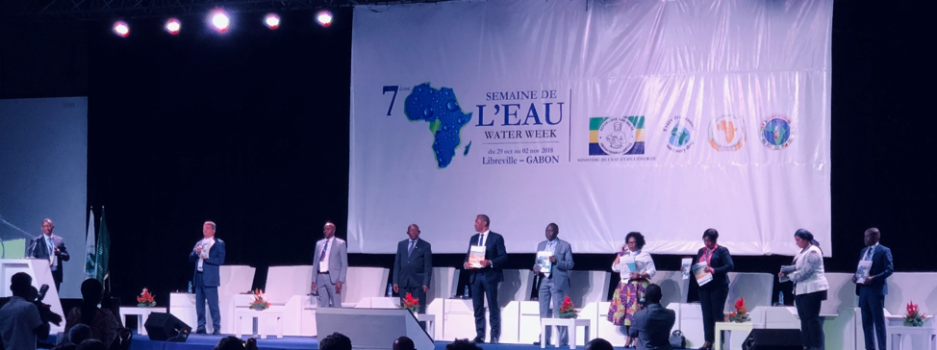AMCOW looks to accelerate progress towards the SDG 2030 Agenda: Key Takeaways from the 7th Africa Water Week
Three years after the Sustainable Development Goals (SDGs) 2030 Agenda was adopted, the African Ministers Council on Water (AMCOW) convened the 7th Africa Water Week (AWW) in Libreville, Gabon. The biennial event offers a unique opportunity for Africans to speak to Africans about their shared challenges, commitments made, and Africa’s solutions to sustain and accelerate progress towards achieving SDG 6—clean water and sanitation for all by 2030. USAID, a lead supporter of AMCOW’s path to self-reliance, was on hand as AMCOW assembled the largest gathering of the continent’s political leadership and decision-makers in the WASH sector. High-level takeaways include:
Progress towards SDG 6 amplifies progress towards the entire SDG Agenda. Development needs outpace public financial resources. Achieving the SDGs will require smarter investments in interventions that unlock the economic potential of other sectors and demonstrate greater return on investment. Investing in SDG 6 translates to systemic gains across all SDGs. While we know productive water is a key growth constraint in the agriculture, energy, and transport sectors, improved delivery of WASH services—or lack thereof—has amplifying effects for education and health too. Research shows that malnutrition leads to poor school performance and higher dropout rates, perpetuating poverty and lost earning potential for households and countries. At AWW, the World Bank presented their WASH Poverty Diagnostic, which examined the impacts of WASH interventions on childhood stunting. The study found that children with access to WASH experienced 10 percent more linear growth than those with no interventions, while children that received healthcare access only saw a 4 percent increase. However, taken together, healthcare and WASH access result in an amplified linear growth increase of 21 percent.
Achieving SDG 6 will require strengthening national-level data management and monitoring systems. Global initiatives like WHO/GLAAS’s TrackFin have gone a long way in helping to benchmark global progress towards SDG 6. However, these reports are only as good as the country data provided. Initiatives like TrackFin need to be coupled with national-level monitoring and reporting strengthening efforts, such as those by USAID’s Water for Africa through Leadership and Institutional Support (WALIS) program. WALIS supports African governments to enhance data collection and management integrity needed to inform sector planning and investment strategies. The benefits of supporting national monitoring systems are two-fold: access to timely and accurate data to better plan and budget for achieving SDG 6, while also informing, and making transparent, progress towards SDG 6.
By: Kate Edelen, Knowledge Management Specialist, WALIS
WALIS provides technical, programmatic, administrative, and logistical support to improve the capacity of African water, sanitation, and hygiene sector. Click here for more information.


